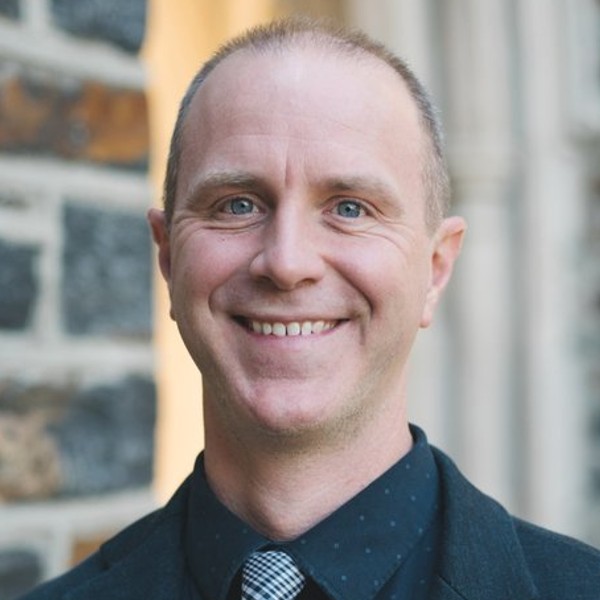Before Kathleen Cravero was appointed president of Oak Foundation, she spent a career at the United Nations.
The leadership lessons of her years at the U.N. would eventually prove useful in her new role at Oak Foundation, not just in her special focus on ending violence against women -- one of the foundation’s six areas of interest -- but also in her honed ability to navigate a consensus-based governing structure.
 “I’ve seen much of the worst of humanity, but I’ve also seen the best, which has really been rewarding,” Cravero said.
“I’ve seen much of the worst of humanity, but I’ve also seen the best, which has really been rewarding,” Cravero said.
The foundation was created by the family of Alan Parker, the former co-owner and CFO of Duty Free Shoppers. In 2014, it granted over $245 million to more than 300 organizations in 45 countries. The foundation addresses issues of global social and environmental concern.
Cravero spoke with Faith & Leadership while at Duke University to give a lecture for the Foundation Impact Research Group, part of the Center for Strategic Philanthropy & Civil Society. The following is an edited transcript.
Q: Please tell us about your organization. What is its mission?
I work for a private family foundation called Oak Foundation. Its headquarters is in Geneva, but it also has major offices in London and Chapel Hill, as well as a number of small offices elsewhere. The foundation was set up in its current form in the late 1990s, with the mission of addressing major social justice issues.
When the family members began the foundation, they identified six important issues that they wanted to create grant programs for.
One is the environment, including climate change and marine conservation. The second program covers issues affecting women, which includes reducing violence against women and trafficking. The third is a program dedicated to stopping the sexual abuse and exploitation of children. The fourth is the housing and homelessness program, which works to prevent homelessness and to increase the availability of affordable housing for low-income people.
The fifth program is an international human rights program that focuses on civil and political rights, including ending impunity for gross human rights violations, supporting human rights defenders and stopping the arbitrary detention of people such as migrants and asylum seekers.
The sixth program focuses on learning differences and works to support public schools, primarily but not exclusively in the U.S., so that they have the awareness, will and capacity to respond to different sorts of learners.
Q: How has the foundation spread its presence globally?
As the foundation developed, certain geographies became important for different programs. Eastern Europe, for instance, became a focus of the child abuse program, because of the high levels of violence against and sexual exploitation of children in eastern European countries.
Belize became a focus of the environmental program because of the Mesoamerican Reef, which is the biggest coral reef outside Australia.
The family wanted to have people on the ground rather than make judgments on these issues from London or Geneva. That’s the reason we have offices in eight different countries.
We make grants in over 40 countries. In some areas, we delve deep. For example, we’ve decided to focus on the unnecessary institutionalization of children in Eastern Europe, because we believe that with the right amount of political will and resources, we could actually have an impact on that problem.
For other issues, like the trafficking of women, we work wherever there are major sources of trafficking. Overall, we don’t just focus on one geographic area or another. Our focus is thematic.
Q: What are the challenges of leading such an organization and maintaining the mission when Oak Foundation has so many disparate efforts?
The first challenge is to understand the organization you’re working for. This is a family-led foundation. They have six different areas they want to issue grants in, and they don’t necessarily want to connect those dots.
So you don’t want to come in as a leader and say, “Well, we’re going to find ways to make these things come together.” You have to go up one level and say, “Well, what are the attributes that you’d see across all the programs even though thematically they’re very different?”
I think what holds the foundation together is that we want to do all of our grant making -- whether it has to do with stopping the trafficking of women or the protection of marine areas in Belize -- we want to do all that with a human rights focus, and with the involvement of affected communities.
They help design the solutions that we eventually fund.
Those are the kinds of issues across Oak Foundation where you say, “Oh, OK, here’s the consistency,” as opposed to seeing imaginary connections between different programs.
Q: As the leader of the organization, how do you keep a consistent ethos with that one-level-up vision that you just described?
Well, the family is very much involved in the grant making. The members each take on one or two programs and work directly with the staff. They’re in there every day.
All our donors are still alive, so they’re shaping our work, and they have a very defined, clear set of ideas about the way they want the stewardship of their resources to unfold.
They come together twice a year as a board, and that’s when we present the progress we’re making as well as the directions that the programs are taking. Then we present a few big grants that we think the family might want to look at all together.
Q: What kinds of challenges does it pose working for a family foundation?
As president of Oak Foundation, my role is more that of facilitator. My greatest resource is the opportunity to influence how the family further develops this foundation. It’s not like being president of the Ford Foundation, which basically has a professional, nonfamily board, and the president decides on the direction and most of the grant making.
The direction of the grant making is guided by the family at Oak Foundation, but the family hires people that it respects and that know their business. It’s a very inter-iterative relationship. It’s not like the staff blindly puts projects forward and the family says yes or no. The family is actually involved in all discussions. It’s a process that can be very satisfying.
Now, if you want to be the kind of president where you’re the leader -- you get to approve or reject everything, you shape everything -- then this is going to be a very frustrating job. For me, it’s been an opportunity to help a pragmatic, generous, well-intentioned, forward-looking family put their fortune to good use.
My work at the U.N. was good training for this, because U.N. staffers have their responsibilities, but it’s the member states that run the U.N. So as a U.N. staff member, you have an opportunity to influence what member states decide to do.
The difference between being in a political organization run by member states and being in a family-run organization is that in the family-run organization, there’s much less bureaucracy and there are no hidden agendas.
Q: What other aspects of your past professional life have proved useful in this role?
Almost all of my roles in the last part of my U.N. career involved getting a disparate number of agencies to work together.
When I worked on conflict prevention, I had to get different stakeholders -- who felt very passionately and emotionally about certain issues, such as how countries should be governed -- to work together and come to consensus in order to stop conflicts.
So good listening and understanding where people are coming from are all-important abilities.
It doesn’t really matter if I feel that someone’s perception is wrong. In terms of resolving a problem, perception is reality to the person who’s expressing it. So when you talk to that person, you need to understand how she has traveled from that base point of wanting to do the right thing to the opinion she’s expressing, because that journey will tell you how you can bring her together with others. That’s just one example of a skill that’s been very helpful.
Q: That sounds like it would be a core skill in the work that you do.
It is! I always say to our staff that my main objective is never to walk into the room proving that I have the best idea. I think a good leader walks out of the room with the best idea, because he listened to what people have to say and he allowed that to shape how he’s going to move forward. I think that’s an important part of leading in a consensus-based organization.
Q: Does your religious background influence your work with the foundation?
I’m a Roman Catholic and grew up in a family of practicing Roman Catholics. Although I believe that the Roman Catholic Church is a flawed institution in some ways, as all institutions are, I would still say that the messages of social justice, the equality of people, the dignity of everyone and the inherent worth of every individual shaped the career choices I made and the way I operated in any job I had.
Q: Given your perspective from your current professional position, where might the church best focus its attention?
When I worked for the U.N., I dealt with global issues on a much more political level. From that experience, I think that all religions need to reflect on the amount of pain, angst and suffering that religious conflicts have brought on the world.
I think that every religious institution should ask, “What can my faith and people of my faith do to reduce this suffering?”
So many of the conflicts we see, whether in Northern Ireland or the Middle East, are based on misunderstandings and intolerance among religions, and I think that cannot be stopped by fiat. You can’t just say, “OK, now we’re going to get along.”
We’ve seen what happens even when you hammer out peace agreements. People are still angry. I think it starts with the first Sunday school class or the first religious class that somebody gets. He needs to understand that his religion should try to bring people together and foster tolerance and dignity in the world.
If we could get a critical mass of people who saw religion in that way, it would make a huge difference.
Q: That’s a very hopeful statement coming from someone who has probably seen many of the worst things that humans can do.
Yes, I’ve seen much of the worst of humanity, but I’ve also seen the best, which has really been rewarding.
Q: Is there anything you would want to add to our conversation that I didn’t ask you?
I think it’s very important to have a publication for Christian leaders to think about how they operate. I’m not of the school that believes that leaders are born. I think that everybody has potential leadership qualities. You may not be president of an organization, but you may be leading a family or leading a community group.
Thinking about what it is in your makeup or your DNA that would allow you to lead people is really important. I also think that it’s important for people to reflect on what makes a good follower. In some ways, in some parts of our lives, we’re leading, and in other parts of our lives, we’re following, and I think following gets a bad rap. So we also need to think about what it means to be a thoughtful follower of a good leader -- but maybe that’s for another magazine.
Q: As you can imagine, given the Christian viewpoint, being a follower is a central concept. What does it mean to be a servant-leader?
Most people are following, but some are thoughtful followers, like followers who will care enough to tell a leader when she’s going off track -- followers that are faithful to their leaders but get out on the street when the leader’s going wrong. I just think there’s an art to being a thoughtful follower that never gets any attention.







